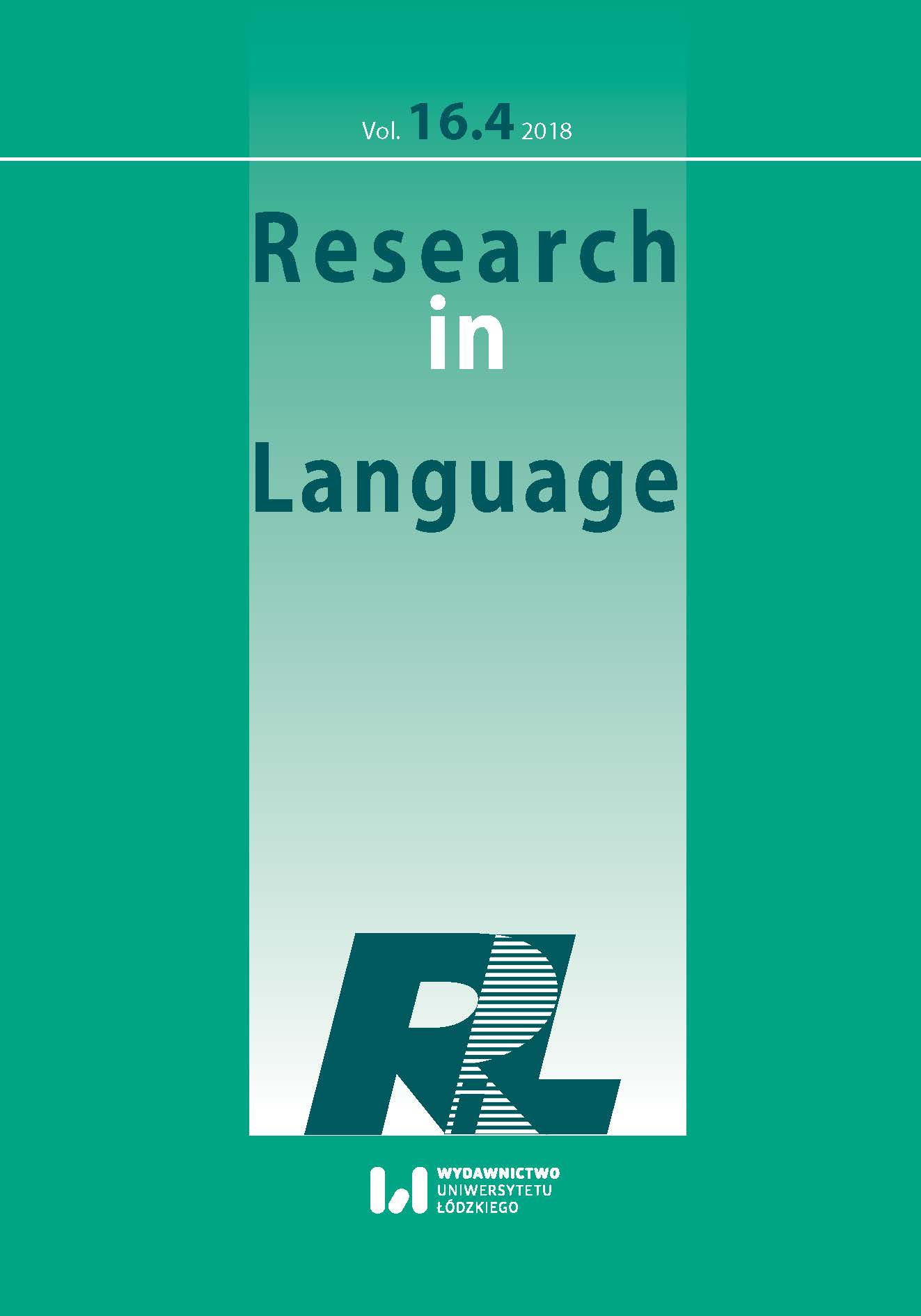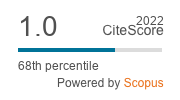Non-Native Attitudes to /θ/ and /ð/: A European Case Study
DOI:
https://doi.org/10.2478/rela-2018-0020Keywords:
attitudes, dental fricatives, endonormative, Euro-English, exonormative, non-native speakersAbstract
This paper investigates the evaluation of the English sounds /θ/ and /ð/ as produced by European non-native speakers. Using the data from a larger web survey, we compared the error judgements by different native and non-native users of English. This was done to establish whether there is any normative convergence among European non-native speakers, or if this was counteracted by other patterns, such as the presence or absence of these sounds in their L1s. Our analysis shows that while European non-native judges do not differ consistently from native-speakers in their judgements, there are also subtle differences between different groups of non-native speakers, implying that we should be careful not to generalise across groups about non-native attitudes to these sounds.
References
Bates, Douglas, Maechler, Martin, Bolker, Ben and Steve Walker. 2015. Fitting linear mixed-effects models using lme4. Journal of Statistical Software 67. 1-48.
Google Scholar
Beinhoff, Bettina. 2008. Looking for the ‘real’ native speaker: the perception of native and non-native English accents by non-native speakers of English. In Ewa Waniek-Klimczak (ed.), Issues in Accents of English, 120-139. Newcastle: Cambridge Scholars Publishing.
Google Scholar
Beinhoff, Bettina. 2013. Perceiving identity through accent: attitudes towards non-native speakers and their accents in English. Oxford: Peter Lang.
Google Scholar
Beinhoff, Bettina. 2014. Perceiving intelligibility and accentedness in non-native speech: a look at proficiency levels. Concordia Working Papers in Applied Linguistics 5. 58-72.
Google Scholar
Blommaert, Jan. 2010. The sociolinguistics of globalization. Cambridge: Cambridge University Press.
Google Scholar
Breiteneder, Angelika. 2009. English as a Lingua Franca in Europe: an empirical perspective. World Englishes 28. 256-69.
Google Scholar
Buschfeld, Sarah. 2011. The English language in Cyprus: an empirical investigation of variety status. PhD dissertation University of Cologne, Germany.
Google Scholar
Collins, Beverley and Inger M. Mees. 1996. The PHONETICS of English and Dutch. Leiden: Brill.
Google Scholar
Crystal, David. 2001. The future of Englishes. In Anne Burns and Caroline Coffin (eds.), Analysing English in a global context, 53-64. London: Routledge.
Google Scholar
Derwing, Tracey and Murray Munro. 2015. Pronunciation fundamentals: evidence-based perspectives for L2 teaching and research. Amsterdam: John Benjamins.
Google Scholar
Devonish, Hubert and Otelemate Harry. 2004. Jamaican Creole and Jamaican English: phonology. In Edgar Schneider, Kate Burridge, Bernd Kortmann, Rajend Mesthrie and Clive Upton (eds.), A handbook of varieties of English, vol. 1, 450-480. Berlin: Mouton.
Google Scholar
Edwards, Alison. 2016. English in the Netherlands: functions, forms and attitudes. Amsterdam: John Benjamins.
Google Scholar
Eurobarometer. 2006. Special eurobarometer 64.3: Europeans and their languages. [Online] Available from http://ec.europa.eu/commfrontoffice/publicopinion/archives/ebs/-ebs_243_en.pdf [Accessed: 20 July 2018].
Google Scholar
EF-EPI. n.d. The world’s largest ranking of countries by English skills. [Online] Available from http://www.ef.nl/epi/ [Accessed: 20 July 2018].
Google Scholar
Forche, Christian. 2012. On the emergence of Euro-English as a potential European variety of English: attitudes and interpretations. Jezikoslovlje 13. 447-478.
Google Scholar
Hanulíkóva, Adriana and Andrea Weber. 2012. Sink positive: Linguistic experience with the substitutions influences nonnative word recognition. Attention, Perception, and Psychophysics 74. 613-629.
Google Scholar
Holiday, Adrian. 2006. Native-speakerism. ELT Journal 60. 385-387.
Google Scholar
Hosmer, David W. and Stanley Lemeshow. 2000. Applied logistic regression. New York: Wiley.
Google Scholar
Hickey, Raymond. 2004. Irish English: history and present-day forms. Cambridge: Cambridge University Press.
Google Scholar
Jenkins, Jennifer. 2000. The phonology of English as an international language: new models, new norms, new goals. Oxford: Oxford University Press.
Google Scholar
Jenkins, Jennifer. 2001. ‘Euro-English’ accents. English Today 68. 16-9.
Google Scholar
Jenkins, Jennifer. 2007. English as a lingua franca: attitude and identity. Oxford: Oxford University Press.
Google Scholar
Jenkins, Jennifer. 2017. An ELF perspective on English in the post‐Brexit EU. World Englishes 36. 343-346.
Google Scholar
Jenkins, Jennifer, Cogo, Alessia and Martin Dewey. 2011. Review of developments in research into English as a Lingua Franca. Language Teaching 44. 281-315.
Google Scholar
Kautzsch, Alexander. 2014. English in Germany: Retreating exonormative orientation and incipient nativization. In Sarah Buschfeld, Thomas Hoffmann, Magnus Huber and Alexander Kautzsch (eds.), The Evolution of Englishes: The dynamic model and beyond, 203-228. Amsterdam: John Benjamins.
Google Scholar
Kirkpatrick, Andy. 2007. World Englishes: implications for international communication and English language teaching. Cambridge: Cambridge University Press.
Google Scholar
Klimczak-Pawlak, Agata. 2014. Towards the pragmatic core of English for European communication. Cham: Springer.
Google Scholar
Kreft, Ita and Jan de Leeuw. 1998. Introducing multi-level modeling. London: Sage Publications.
Google Scholar
Ladefoged, Peter and Ian Maddieson. 1997. The sounds of the world’s languages. Oxford: Blackwell.
Google Scholar
Luke, Douglas. 2004. Multilevel modeling. Thousand Oaks, Ca.: Sage.
Google Scholar
MacKenzie, Ian. 2014. English as a lingua franca: theorizing and teaching English. Abingdon: Routledge.
Google Scholar
MacKenzie, Ian. n.d. The allophonic rules of Spanish. [Online] Available from: https://www.staff.ncl.ac.uk/i.e.mackenzie/allophonr.htm [Accessed: 20th July 2018].
Google Scholar
Modiano, Marko. 2017. English in a post‐Brexit European Union. World Englishes 36. 313-327.
Google Scholar
Mollin, Sandra. 2006. Euro-English: assessing variety status. Tübingen: Narr.
Google Scholar
Pampel, Fred. 2000. Logistic regression: a primer. Thousand Oaks, CA: Sage Publications.
Google Scholar
Quené, Hugo and Huub van den Bergh (2008). Examples of mixed-effects modeling with crossed random effects and with binomial data. Journal of Memory and Language 59. 413-425.
Google Scholar
R Development Core Team. 2016. R: a language and environment for statistical computing. Vienna: R Foundation for Statistical Computing. [Online] Available from http://www.R-project.org/ [Accessed: 1 December 2016].
Google Scholar
Salakhyan, Elena. 2012. The emergence of Eastern European English. World Englishes 31: 331-350.
Google Scholar
Schneider, Edgar. 2004. Global synopsis: phonetic and phonological variation. In Edgar Schneider, Kate Burridge, Bernd Kortmann, Rajend Mesthrie and Clive Upton (eds.), A handbook of varieties of English, vol. 1, 1111-1138. Berlin: Mouton.
Google Scholar
Schneider, Edgar. 2017. The linguistic consequences of Brexit? No reason to get excited! World Englishes 36. 353-355.
Google Scholar
Seidlhofer, Barbara. 2001. Towards making “Euro-English” a linguistic reality. English Today 68. 14-16.
Google Scholar
Van den Doel, Rias. 2006. How friendly are the natives? An evaluation of native-speaker judgments of foreign-accented British and American English. Utrecht: LOT.
Google Scholar
Van den Doel, Rias. 2008. The blind spots of Jenkins’s Lingua Franca. In Ewa Waniek-Klimczak (ed.), Issues in Accents of English, 140-149. Newcastle: Cambridge Scholars Publishing.
Google Scholar
Van den Doel, Rias, and Hugo Quené. n.d. The accents of European English: an online experiment. [Online] Available from let.uu.nl/~Rias.vandenDoel/personal/wwstim/eureng/html/ [Accessed: 20 July 2018].
Google Scholar
Van den Doel, Rias, and Hugo Quené. 2013. The endonormative standards of European English: emerging or elusive? English World-Wide 34. 77-98.
Google Scholar
Walker, Robin. 2010. Teaching the pronunciation of English as a lingua franca. Oxford: Oxford University Press.
Google Scholar
Weinberger, Steven. 2011. Speech accent archive. [Online] Available from http://accent.gmu.edu [Accessed: 20 July 2018].
Google Scholar
Wells, John. 2008. With. Longman pronunciation dictionary. 3rd edn. Edinburgh: Pearson, 904.
Google Scholar
Wells, John. 2010. Exotic dental fricatives. John Wells’ Phonetic Blog. 7 April 2010. [Online] Available from http://phonetic-blog.blogspot.nl/2010/04/exotic-dental-fricatives.html [Accessed: 20 July 2018].
Google Scholar
Downloads
Published
How to Cite
Issue
Section
License

This work is licensed under a Creative Commons Attribution-NonCommercial-NoDerivatives 4.0 International License.










